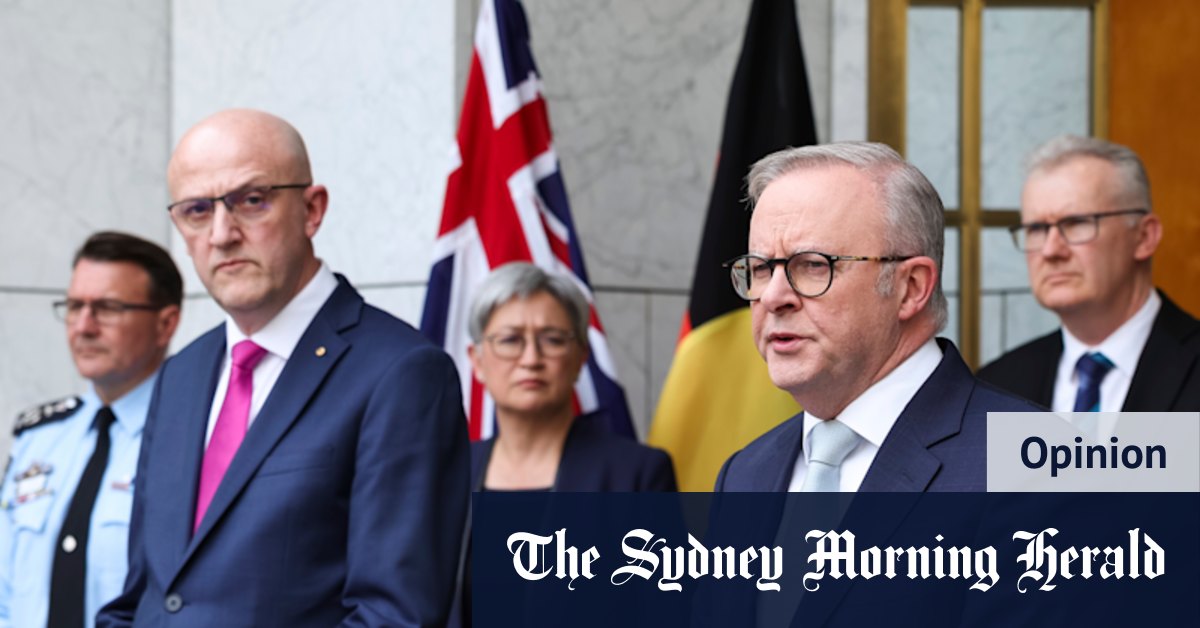
The Iran security crisis has brought the Middle East conflict to our shores
- [email protected]
- 0
- Posted on
The Albanese government’s expulsion of the Iranian ambassador and other embassy staff was, in diplomatic terms at least, as serious as it gets. No Australian government has taken such a step since the end of the Second World War. But it was in line with the seriousness of the offence. The Iranian government stands accused of directing attacks against Jewish interests on Australia soil, using multiple cut-outs to cover its tracks. That is, low-level criminals acting at the direction of higher-level criminals overseas who were doing the bidding of Tehran.
The use of criminal elements to conduct operations on its behalf, often unwittingly, is a modus operandi that Iran has increasingly relied upon. In October last year the head of MI5, Britain’s domestic security agency, indicated that Iranian plots on British soil had been conducted at an unprecedented pace and scale since 2022. They had also made extensive use of criminals – “from international drug traffickers to low-level crooks” – as proxies. And at the end of July the United States Department of State, along with a dozen other countries issued a Joint Statement on Iranian Threat Activity in North America and Europe in which it accused Iranian intelligence agencies of “increasingly collaborating with international criminal organisations to target journalists, dissidents, Jewish citizens…”

AFP Commissioner Reece Kershaw, ASIO director-general of security Mike Burgess, Foreign Affairs Minister Penny Wong, Prime Minister Anthony Albanese and Home Affairs Minister Tony Burke at Parliament House on Tuesday.Credit: Alex Ellinghausen
ASIO has concluded that this phenomenon has now come to Australia’s shores. Law enforcement agencies had recently been giving hints about the potential involvement of a state-based actor in some of the attacks carried out in Australia. The identities and backgrounds of those arrested for the attacks were also not what would typically be considered profiles of those engaged in politically motivated attacks. But given the complexity of the Iranian operational architecture, it has taken Australian intelligence agencies time to be sure enough of the reasons for these attacks to present their findings to government.
There will, of course, be more that the intelligence agencies want to determine. They have suggested that other attacks were also state-directed but have not been able to confirm this. The motivation also remains debatable. The government has stated that the aim was to target Australia’s social cohesion. In reality, a number of limited graffiti and arson attacks, while obviously concerning, are unlikely to have the impact on the broader Australian community that outsiders may imagine. Australian society is more robust than perhaps the government or elements of the media gives it credit for. Perhaps it was an opportunistic campaign – Iranian intelligence agencies may have established a relationship with a criminal network with links to Australia, and this presented an opportunity for Tehran to target Jewish interests as part of its broader anti-Israeli ideology.
Loading
The Albanese government has reacted swiftly and strongly to this revelation. It has also promised to proscribe Iran’s Islamic Revolutionary Guard Corps, who it blames for the plots, as a terrorist organisation in its entirety. This will require a deft hand in drafting the legislation necessary to bring this to a reality, as well as a nuanced approach by immigration officials. The Revolutionary Guard is the fourth arm of the Iranian military – a tri-service mirror force that is outside the Defence Ministry. But it also absorbs tens of thousands of conscripts each year doing their compulsory military service, often in banal, sedentary roles. We’ve seen in countries such as the US and Canada how bans and other controls on those who have served in what is now a listed terrorist organisation – but which wasn’t when Iranians were conscripted – has affected immigrants who have yet to obtain citizenship, and on Iranians who seek a visa to study, or visit relatives, or to emigrate.
Loading
This security crisis has also allowed the government to look governmental. That the prime minister, foreign minister, home affairs minister and head of ASIO all attended Tuesday’s press conference spoke to the gravity of the issue, as did the unprecedented nature of the action it took. The opposition has indicated it will support the listing of the Revolutionary Guard, and the involvement of the Iranian government in at least two of the attacks will allow the prime minister to argue with greater authority that his graduated criticism of the Israeli government and support for a Palestinian state has not led to a flourishing of antisemitism.
The revelation of these foreign-directed attacks against Australia shows how intelligence agencies need to be alert to the methods our enemies will use to achieve their aims. It also shows once again the way in which, despite successive governments’ desire to focus on threats emanating from the Indo-Pacific, the Middle East continues to find a way of imposing itself on Australia.